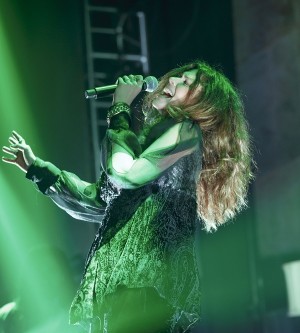Bringing Joplin Back: A Little Piece of Janis’ Heart
The ’60s were raw, urgent years, indicting form in favor of free expression, and with independent cultural eruptions on every corner, from bucolic college campuses to the dark depths of inner cities. Trying to institutionalize that decade in any kind of creative endeavor stands in stark contrast to the volatility of the period, and can and has been in the past a fool’s errand. Most often, the effort becomes a cartoon or cliché made by people who were not there, never quite capturing the moment’s gut-wrenching verve.
Yet somehow, the writers and producers of A Night with Janis Joplin have pulled it off. If you were alive in 1968, you remember the first time you heard Joplin sing “Piece of My Heart,” backed by her first band, Big Brother and the Holding Company. You probably also remember where you were, who you were with, and who brought the dope to smoke. A white girl who could hold her own with the great Afro-American blues singers of all time, from Etta James to Odetta, now walked among us. Her power made everyone, but especially young white girls, feel powerful; and the fact that she looked like the kid next to us in Algebra class made it seem like there just might be power and greatness somewhere in us as well. This theater piece brings it all back.
The legend, the lady and the voice are all addressed in A Night with Janis Joplin, as are Joplin’s most obvious influences, the aforementioned James, Bessie Smith, Odetta and Aretha Franklin. The evening is, in fact, a dialogue between Joplin and her precursors — she even sings with them periodically, as when the Joplin character joins James in a rousing version of “Tell Mama.” The structure has Joplin up front, close and personal with the audience, telling her life story and singing, then singing again with her heroines, then back to storytelling and the Joplin oeuvre. The other legends appear on a set of interconnecting catwalks, so they seem to come out of a dream; and the dream, of course, was Joplin’s.
Mary Bridget Davies is astonishing as the lead — she channels Joplin, right down to pumping her fist in the air and the ratty counter-culture wardrobe. She has the frizzy, curly hair that she flips around to the music; the jewelry has a lot of beads, and one has not seen more peasant blouses since the early days of Dylan in Greenwich Village. Her voice is so close to Joplin’s that if you close your eyes, you could swear you were back in 1967 in the Haight. By the time she got to the rollicking “Mercedes Benz,” everyone (even Joan Rivers, in the audience this night) was rocking out. With that said, the story of her childhood in Port Arthur, Texas was sugarcoated from what Joplin herself spilled in interviews. It became about a cozy home with a loving brother and sister (who are, by the way, involved with the production of this show) and replacing the usual story of pain she felt at being different from everyone in town and itching to get out. The monologues spend too much time on her attachment to the blues (we know this already) and her endless search for love, but come alive when the music happens, and when she says after a particularly noisy round of applause, “could any man give me THIS?” I think we know the answer.
The incredible women playing the Joplinaires — who embodied all the Joplin idols and also sang as a group — each brought something to the party, but perhaps highest kudos go to Taprena Michelle Augustine whose rendition of “Summertime,” sung as a generic blues woman, brought down the house. The stage set brought back the strange industrial feel of old-time, thrown-together clubs like the Electric Circus in New York — a series of interlocked metal runways, one high and one low, for all the supporting players with Joplin right out front. It fit the subject matter perfectly. The Joplinaires, although they each approximated the women they inhabited rather than conjuring them outright, gave Joplin a strong and unmistakably sound base from which to take off.
So, with a few caveats, anyone who ever loved or lived through the ’60s should see this show and pay more than a passing homage to Ms. Davies whose talent made it possible, even though every now and then she may slip from character — it is doubtful that anyone would not have, given the strenuous nature of the role. And even if this incarnation of Big Brother and the Holding Company played in tune (the original did not), you will still leave the theater with the sense that something big has happened there and that Joplin — who succumbed so young to her era’s excesses — still lives someplace where we can have access to her extraordinary, soulful presence.
“A Night with Janis Joplin” is currently playing on Broadway in NYC at the Lyceum Theatre, located at 149 W 45th St, between 6th & 7th Ave. For more information, including ticket price and performance schedule, please visit http://anightwithjanisjoplin.com or call Telecharge at 212-239-6200.
Video Courtesy of: Boneau/Bryan-Brown.
Featured image: Pictured: Mary Bridget Davies stars as Joplin in “A Night with Janis Joplin.” Photo Credit: Joan Marcus, 2013.


